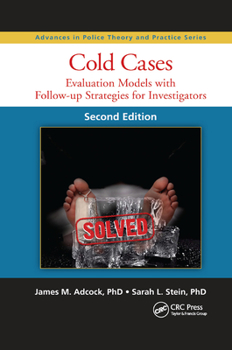Cold Cases: Evaluation Models with Follow-Up Strategies for Investigators, Second Edition
Because the investigation of cold cases is usually an arduous and time-consuming task, most law enforcement agencies in the United States are not able to dedicate the resources necessary to support the cold case investigation process. However, when those cases are fully pursued and prosecuted, they often result in convictions and lengthy prison terms. Cold Cases: Evaluation Models with Follow-up Strategies for Investigators, Second Edition saves law enforcement time by providing detailed guidelines for determining if a cold case is solvable, and if so, how to organize, manage, and evaluate the investigation. It also provides techniques for developing investigative strategies to complement the evaluation process and resolve the crime.
This second edition features a new revised model and methodology for investigating cold cases suitable for all police and public safety agencies--large or small, domestic or international. This new model is more expeditious and convenient for departments that have less manpower and experience in dealing with cold cases. It emphasizes the prioritization of cold cases based on the availability of physical evidence and the chances of deriving matches from said evidence and an identified person of interest.
Additional topics covered in the second edition include:
How cases go cold Strategies for creating a cold case unit Cold case investigations in a Dutch educational environment--a chapter written by members of the Dutch Police Academy New forensic science technologies, including DNA, CODIS, and AFIS Case studies demonstrating advances in suspectology Strategies for effective investigative interviewing Challenges posed by staged crime scenes in cold cases How to craft a cold case evaluation reportThe expert authors of this book maintain The Center for the Resolution of Unresolved Crimes





